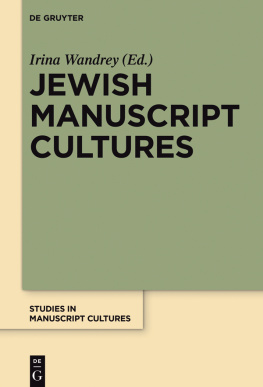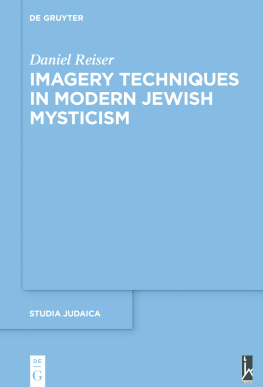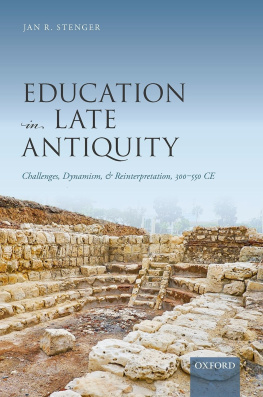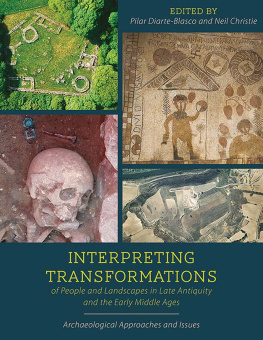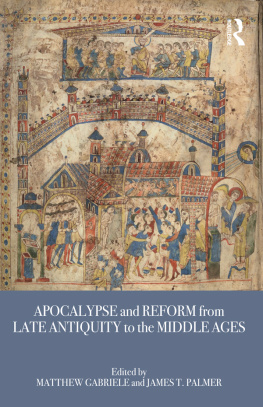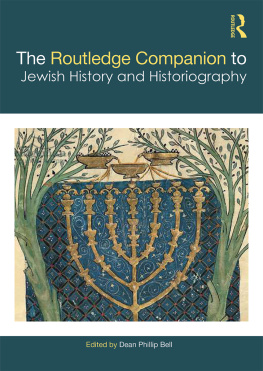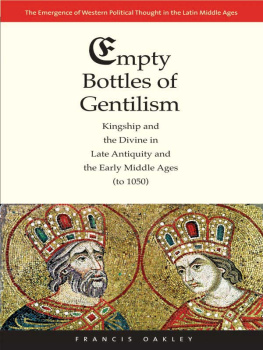Dan - Jewish Mysticism
Here you can read online Dan - Jewish Mysticism full text of the book (entire story) in english for free. Download pdf and epub, get meaning, cover and reviews about this ebook. City: Northvale;N.J, year: 1998;1999, publisher: Jason Aronson, Inc., genre: Religion. Description of the work, (preface) as well as reviews are available. Best literature library LitArk.com created for fans of good reading and offers a wide selection of genres:
Romance novel
Science fiction
Adventure
Detective
Science
History
Home and family
Prose
Art
Politics
Computer
Non-fiction
Religion
Business
Children
Humor
Choose a favorite category and find really read worthwhile books. Enjoy immersion in the world of imagination, feel the emotions of the characters or learn something new for yourself, make an fascinating discovery.

Jewish Mysticism: summary, description and annotation
We offer to read an annotation, description, summary or preface (depends on what the author of the book "Jewish Mysticism" wrote himself). If you haven't found the necessary information about the book — write in the comments, we will try to find it.
Dan: author's other books
Who wrote Jewish Mysticism? Find out the surname, the name of the author of the book and a list of all author's works by series.
Jewish Mysticism — read online for free the complete book (whole text) full work
Below is the text of the book, divided by pages. System saving the place of the last page read, allows you to conveniently read the book "Jewish Mysticism" online for free, without having to search again every time where you left off. Put a bookmark, and you can go to the page where you finished reading at any time.
Font size:
Interval:
Bookmark:
MYSTICISM
MYSTICISM

Most of the sixty studies collected in these volumes were published in scholarly journals and other scientific publications; a few are presented here for the first time. It is my pleasant duty to thank the scores of editors and publishers who contributed in various ways to the present form of these studies. They all took part in giving the articles their final internal and external shape. Almost all of these studies are based on lectures given in American and European universities in the last thirty years, and I have benefitted from the remarks of colleagues and students who participated in the discussions.
Joseph Dan
Cambridge, Mass.
This book was set in 11 pt. Goudy by Hightech Data Inc., of Bangalore, India and printed and bound by Book-mart Press, Inc. of North Bergen, NJ.
Copyright 1998 by Joseph Dan
10 9 8 7 6 5 4 3 2 1
All rights reserved. No part of this book may be used or reproduced in any manner whatsoever without written permission from Jason Aronson Inc. except in the case of brief quotations in reviews for inclusion in a magazine, newspaper, or broadcast.
Library of Congress Cataloging-in-Publication Data
Dan, Joseph, 1935
Jewish mysticism / by Joseph Dan.
p. cm.
Includes bibliographical references and index.
Contents: v. 1. Late antiquityv. 2. The Middle Ages.
ISBN 0-7657-6007-X
1. MysticismJudaismHistory. I. Title.
BM723.D365 1998
296.7'12'09dc21
9842910
Printed in the United States of America. Jason Aronson Inc. offers books and cassettes. For information and catalog write to Jason Aronson Inc., 230 Livingston Street, Northvale, NJ 07647-1726, or visit our website: http://www.aronson.com
The author gratefully acknowledges the permissions granted by the publications in which the essays in this volume originally appeared:
The Ancient Hechalot Mystical Texts in the Middle Ages, from Bulletin of The John Rylands University Library of Manchester, Vol. 75 (John Rylands University Library Of Manchester: Manchester, England 1993), .
The Book of the Divine Name by Rabbi Eleazar of Worms, from FJB 22 (Gesellschaft Zur Forderung judaistischer Studien in Frankfurt am Maine, e.V.: Berlin 1995), .
The Concept of History in Hekhalot and Merkabah in Literature, from Bina, Vol. I, Studies in Jewish History (Praeger Publishers 1989), .
The Concept of Knowledge in the Shiur Komah, from Studies in Jewish Religious and Intellectual History Presented to A. Altmann. S. Stein and R. Lowe (eds.) (University of Alabama Press: AL 1979), .
.
Gershom Scholem: Between History and Historiography, from Bina Vol. I Studies in Jewish Thought (Praeger Publishers 1989), .
Jewish Gnosticism? from Jewish Studies Quarterly 2 (J.C.B. Mohr Publishers: Tuebingen 1995), .
Kabbalistic and Gnostic Dualism, from BinaVol. 3, Studies in Jewish Intellectual History in the Middle Ages (Praeger Publishers 1989).
The Language of Creation and Its Grammar, from Tradition und Translation, Festschrift Carsten Colpe. R. Haffke, H. M. Hausig, et. al. (eds.) (Walter de Gruyter: Berlin, New York 1994), .
The Language of the Mystics in Medieval Germany from Mysticism, Magic, and Kabbalah in Ashkenazi Judaism (Walter de Gruyter: Berlin and New York 1995), .
Manasseh ben Israel and the Concept of Evil in Seventeenth-Century Jewish Thought, from Jewish Thought in the Seventeenth Century (Harvard University Press: Cambridge, MA 1987), .
The Revelation of the Secret of the World: The Beginning of Jewish Mysticism in Late Antiquity (Brown University, Department of Judaic Studies: Providence, RI 1992), Paper no. 2.
The Seventy Names of Metatron, from Proceedings of the Eighth World Congress of Jewish Studies, Vol. III (Eighth World Congress of Jewish Studies 1982), .
Three Phases of the History of the Sefer Yetzira, from FJB 21 (Gesellschaft Zur Forderung judaistischer Studien in Frankfurt am Maine, e.V.: Berlin 1994), .
Three Types of Ancient Jewish Mysticism (University of Cincinnati Department of Jewish Studies 1986), .
Pesach ha-Yira Veha-Emunah and the Intention of Prayer in Ashkenazi Hasidic Esotericism, from FJB 19 (Gesellschaft Zur Forderung judaistischer Studien in Frankfurt am Maine, e.V.: Berlin 1991-92), .
Introduction
One of the most significant characteristics of the texts that represent the earliest mystical phenomenon in Jewish religiosity is the complete absence of historical information in the two dozen treatises that comprise the Hechalot and Merkavah literature. It is impossible, in the present state of scholarly research, to establish with any confidence the chronological sequence or the historical circumstances in which these treatises were written. This Introduction and the following studies seek to present the key problems concerning the definition and the central subjects of the texts related to the early beginnings of Jewish mysticism in Late Antiquity, which had meaningful impact on its later development in the High Middle Ages and in modern times.
The concept of beginning, concerning historical phenomena, is one that is both untenable and unavoidable. Any statement pointing to the beginning of any process, cycle, or epoch easily can be challenged by the presentation of some precedents that are found in previous periods. History does not recognize any absolute beginnings or any absolute endings; the dynamics of historical development always include a combination of the old and the new, constantly changing yet still retaining some of their old characteristics. The careful historian who wishes to preserve his writing beyond any possibility of contradiction had better avoid the term completely.
Without the concept of beginning, on the other hand, there is no history, because beginnings represent change, and historical development is the expression of change. Without multiple new beginnings in every phase and every realm, history is static. The intellectual world in the twentieth century was deeply influenced by ideologies and narratives that denied beginning and postulated the eternal repetition of fixed phenomena, reducing history to superficial variations expressing unchanging principles. In the realm of the study of religion, the most popular conceptions of this kind were those presented by Carl Gustav Jung, Mircea Eliade, and Joseph Campbell. In different ways, all three denied historical development in the fields of religion, philosophy, and art; there are fixed archetypes that repeat themselves in superficially changing guises in all human cultures, in every period. Jung saw these archetypes as essentially psychological, springing from the collective unconscious common to all human beings; Eliade believed that he identified a fixed set of cultural symbols that repeat themselves in all rituals and spiritual expressions; and Campbell viewed everything as the unfolding and re-unfolding of the same basic mythical narrative. The work of the scholar, according to these writers and the various schools that sprang up in their wake, is to identify the underlying similarity beyond the apparent diversity, and to reduce them to their eternal principles, which remain forever unchanged. In such a structure, beginning has no meaning; everything was always there, noticed or unnoticed.
Font size:
Interval:
Bookmark:
Similar books «Jewish Mysticism»
Look at similar books to Jewish Mysticism. We have selected literature similar in name and meaning in the hope of providing readers with more options to find new, interesting, not yet read works.
Discussion, reviews of the book Jewish Mysticism and just readers' own opinions. Leave your comments, write what you think about the work, its meaning or the main characters. Specify what exactly you liked and what you didn't like, and why you think so.


